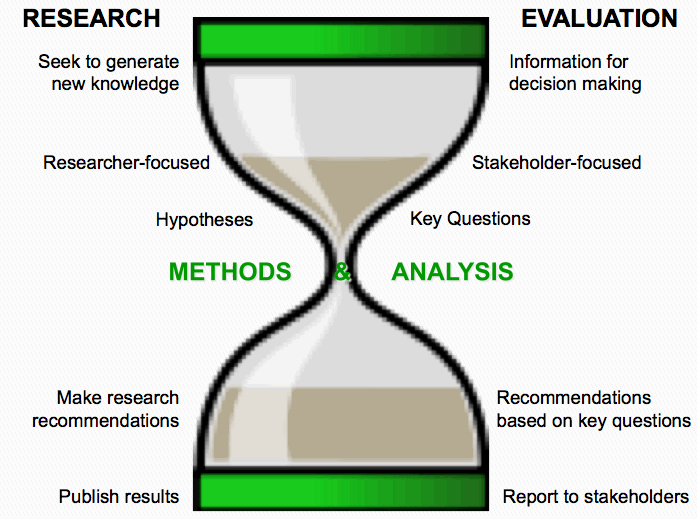My name is John LaVelle. One of the things that I have struggled with is describing what evaluation is and why it’s important. Following up on that, many people ask about how evaluation is related to research.
Rad resource: Eva the Evaluator by Roger Miranda and Birgit Stadler. This is a delightful and inexpensive book about a little girl named Eva and her father the evaluator. Eva isn’t exactly sure what he father does, and so the book is about her father explaining evaluation in easily understandable terms, and Eva imagining herself engaged in the scenarios he described. And, reading the book, I was pleasantly surprised with all the inside jokes, such as a cookbook titled “Preskill’s Chocolate Chip Cookies” and various evaluation theorists costumed as superheroes.
Hot Tip: Visualize the relationship like an hourglass. I tend to be a visual person, and so I developed a picture of an hourglass with research on one side and evaluation on the other. This picture illustrates how evaluation and research begin at different points and funnel to using the same methods to answer questions and analyze data. They diverge again when it comes time to report on the outcomes (or processes) under study.
This contribution is from the aea365 Daily Tips blog, by and for evaluators, from the American Evaluation Association. Please consider contributing – send a note of interest to aea365@eval.org.


I’m thrilled to find out where this graphic came from and to be able to attribute it to you. I got it from an epidemiologist in a state health department probably not too long after you posted it. I’ve used it to start conversations at CDC ever since. I got here thanks to Dana’s post. Thanks to you both!
Hi John,
I’m a grad student majoring in Learning, Design, and Technology at Arizona State University. I’m currently studying about research and evaluation myself and found your hourglass approach to both concepts as unique and extremely helpful. I’m also a visual learner, and this helped in forming my own thoughts about the differences between these two concepts.
Both evaluation and research are both systematic in nature, however, their goals and purposes are much different. As your diagram suggests, research strives to seek knowledge on existing information while proving or disproving information that is found. Evaluation seeks to find information used in determining whether a subject or program is effective and efficient. In other words, is it performing in the way it was intended. While research is value-free, that is researchers only seek truth to verify existing information while seeking new information, evaluation or what is evaluated is determined by its merit, worth, and value.
This is very good work, and I look to read more from you on this and other topics. Thanks!
Hi John,
Thank you very much for your hourglass illustration which I found very informative and I have used it in developing an education package.
Best wishes
good information..thank you
Hi John,
Your posting was clear and informative, and I have a better understanding of describing evaluation. Your visualization of the hourglass is an excellent representation of the relationship between research and evaluation. I, too, struggle with describing the importance of evaluation and the similarities/differences between research and evaluation. I found it interesting how you indicated the differences between research and evaluation and then eventually funneled towards utilizing the same methods to answer questions and analyze data.
Hi John,
Actually, this image is the best thing I have seen to explain the close relationship between research and evaluation definitions. While they seem to be terms that are interchanged sometimes, they clearly serve different purposes. Both lead to the growth in knowledge but the biggest difference that was pointed out to me was the beneficiary of the results, to publish or report to stakeholders. Very well done! Thanks for the information.
I’ve found this represntation useful and I’ll be using it in my blog. Thanks
Hi everyone,
Hard to believe it’s been over seven years since I posted this image. Time moves so quickly!
I’m updating my vita and trying to get a sense of where and how this image has been used. If you have found it helpful, please drop me a line and let me know where you used it.
Thank you!
jlavelle@umn.edu
Hi John,
Just letting you know that I am using your model to justify whether I believe a study on program evaluation to be research or evaluation. This is an open book exam question I have been given in my first subject of The Master of Evaluation at the University of Melbourne. I have found your model very useful. Hope you are well!
The chart is excellent I have never seen someone able to provide insight on the differences between evaluation and research in such a clear and understandable way. Excellent piece of work.
Thank you Stan, I’m happy you like it!
Pingback: Ask the Right Questions | Ampersand
Pingback: Ask the Right Questions | Ampersand
Pingback: What Graduate Students Should Unlearn Before Becoming Evaluators | Learning Culture
Pingback: Science in Canada: Issues Affecting Trainees
John, I really found your visual helpful!
Bob, John is the coordinator for the blog. You can reach him at aea365@eval.org. Thanks for your enthusiasm!
John Can you contact me – want to ask you about the graphic and how you use it – would like to use in training manual rdk_associates@verizon.net
Susan do you have John’s contact info – cant find it. thanks
John – love the graphic! And was following along well until I got to “Make Research Recommendations” versus “Recommendations Based on Key Questions”
I wasn’t clear what you meant regarding “Make research recommendations” and whether this was recommendations for future research?
The editor in me wanted to make the construction parallel, something like “Make research recommendations” and “Make programmatic recommendations” (assuming we’re following a paradigm that is comfortable with recommendation-making) or “Make evaluation recommendations.” But I wasn’t clear as to the appropriate interpretation.